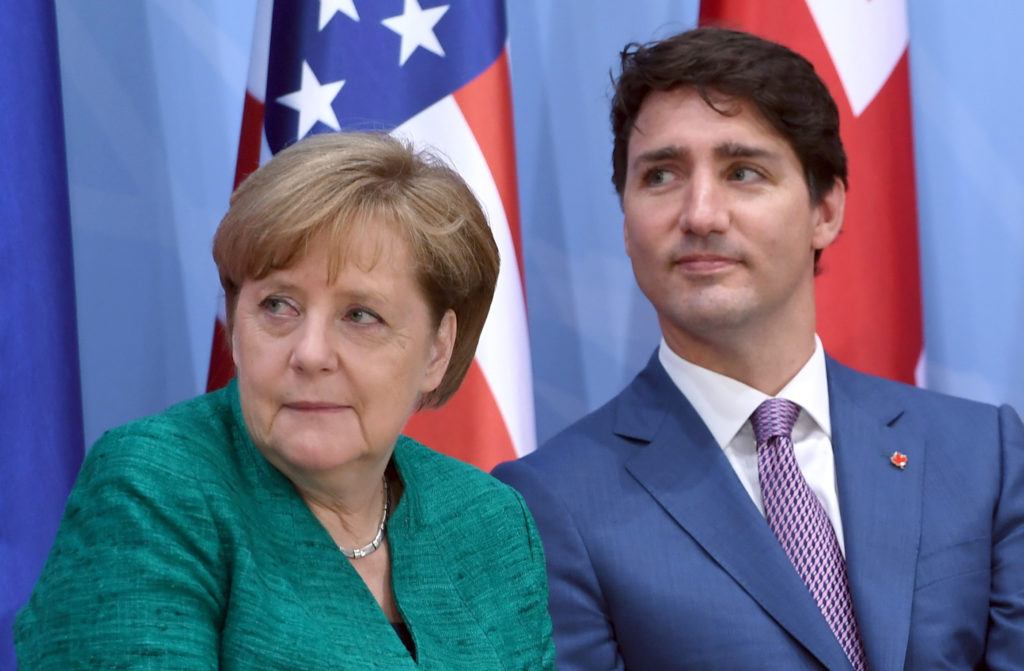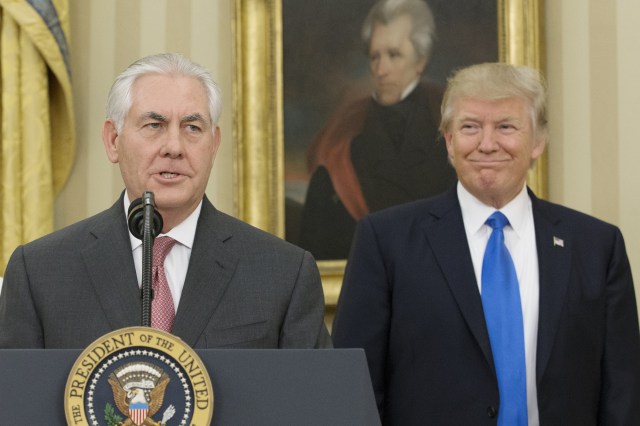President Trump looks pleased at the appointment of his new Secretary of State, Rex Tillerson. Thirteen months later he had fired him. Credit: Michael Reynolds/PA Images

It is only a little more than a year since Donald Trump became US President, yet the damage done to the international security architecture has been significant. This is not because there has been a seismic shift in the ways of doing business since Trump’s inauguration on 20 January 2017. Rather, he has accelerated a fundamental evolution in global power structures that had been under way for at least a decade, if not longer.
This is why the major security threats we face today – North Korea, Russia, China, the Middle East, global terrorism – are far more concerning than their antecedents. Today’s challenges pose a more serious threat to global stability because the United States is not providing the necessary leadership and partnership with allies to mitigate them. Instead, President Trump’s disruptive management style has resulted in a leadership vacuum on the global stage that is being filled by nefarious elements.
None of this should be surprising. We all knew he had a penchant for firing people. Over the last year, 43 per cent of Trump’s most senior staffers have either quit, changed jobs or been sacked. This achievement, according to Politifact, is more than double that of any other administration since 1981, when people started counting. Last week we witnessed the public humiliation of Rex Tillerson getting fired by tweet – also known as ‘Rexit’ – and the firing of FBI deputy director Andrew McCabe just days before his retirement.
We are anticipating others in the coming weeks, including National Security Adviser H R McMaster, White House Chief of Staff John Kelly and Attorney General Jeff Sessions. And of course, a bigger and separate concern is if he fires special counsel Robert Mueller.
Most of those axed have had their reputations destroyed, unlike in past US Administrations when departing officials have had their careers fast-tracked. Many have faced enormous legal fees because they have been ensnared in Mueller’s investigation, and some may even end up in prison. Yet, if we can step away from all the chaos and noise, there are three reasons why these rapid transitions at the highest levels of government matter.
The first relates to Trump’s inexperience in foreign policy coupled with his professed lack of interest in any of the corresponding details. He has admitted that he rarely reads his daily brief from the CIA, and it does not appear that he gets regular in-depth oral briefings either. He seems to consume most of his information from Fox TV. The results have been all too evident, with about-turns on most major issues, notably North Korea, Syria, China, Russia, Iran, and even the Israel-Palestinian dispute.

This lack of interest and focus could be overcome if he fully delegated to his senior appointees, who would then have the responsibility for developing and implementing relevant strategies. While he has entrusted more authority over military operations to his Secretary of Defence, Jim Mattis, based on his view that the National Security Council should be more strategically focused, the reality is that he has not enabled the NSC to be strategic because he habitually undermines his national security adviser. The same applied to Tillerson, his top diplomat, who was frequently left in the dark about major decisions (such as North Korea or the Qatar-Saudi dispute) or was sidelined by Trump’s even more inexperienced son-in-law, Jared Kushner.
It turns out that no one speaks for Trump, which even the President admitted when asked about the numerous vacancies at senior levels in the State Department. He replied: “I’m the only one who matters.”
This takes us to the second related challenge. Rapid turnover at the top will mean concomitant shifts in strategy, given the propensity of each new appointee to want to make their own mark on the office they run. Tillerson spent most of his time focused on major internal reforms, which mostly meant taking things apart without putting things back together again.
This is not to say that the Department should not be reformed, but Tillerson’s tactics only succeeded in lowering morale and left gaping holes at senior levels in Washington and abroad. Meanwhile, those diplomats who were in post were not getting consistent and coherent instructions because there has been no real policy to follow.
In fact, one would be hard-pressed to define US foreign policy for a range of other countries, whether in sub-Saharan Africa, the Middle East, or even North Korea, beyond the promised sit-down between Trump and Kim Jong-un. In other situations, such as Syria, America has shamefully ceded leadership on the peace process to Iran and Russia, countries that in no way share the same values as the United States, and rewarding a regime that has been largely responsible for 500,000 civilian deaths and the displacement of half the population.
It’s unlikely that Mike Pompeo will continue with Tillerson’s reform agenda, given how unpopular it has been with the career staff at the State Department. Already, offices in line for decapitation are plotting their strategies for making their case to stay off the chopping block. Pompeo is more aligned with the President’s worldview on issues such as the Iran deal, but he is unlikely to be fully joined-up on all issues, such as Russia, where he has been far more critical of Putin than has the President. Hence, it is only a matter of time before Pompeo is also moved on, meaning more whiplash for anxious civil and foreign service professionals and too many ad hoc foreign policy decisions. Trump recently said: “There will always be change, and I think you want to see change.”

An unfocused President delighted with rapid transitions at senior levels can only lead to inconsistent and incoherent foreign policy, and causes anxiety and hesitation among allies, while adversaries will continue to exploit the power vacuums created. This is the case despite the recently published US National Security Strategy (December 2017), which outlines Trump’s America First agenda and concentrates on the threats posed by China, Russia and global terrorism, among others.
It is hard to believe that the document will do more than gather dust on the shelves at the Oval Office, given that Trump himself has contradicted many of its points (for instance, when announcing the strategy he spent more time praising Putin than underlining the threats posed by Russia).
This lack of coherence in implementing foreign policy inevitably leads to the third area of concern: the host of negative centrifugal forces unleashed because the United States has been forfeiting its traditional role as the guardian and guarantor of liberal values. Since the Second World War, with few exceptions, American leadership has revolved around promoting a rules-based, democratic and open international order, in close partnership with established allies, notably the United Kingdom. That approach has come under significant attack from a US President who has abandoned – or who is trying to undermine – many of the precepts, practices, alliances and commitments of the past 70 years, especially if they were promoted by his immediate predecessor, Barack Obama.
What is surprising is how swiftly things have deteriorated in many parts of the world, without overt US leadership. The result has been leadership going to the highest bidder, depending on the issue. China, for example, is already assuming pole position on climate change and free trade. Russia and Iran have consolidated their hold on places they care about, such as Syria.
Earlier in March, the UN High Commissioner for Human Rights, Zeid Raad al-Hussein, woefully concluded: “Oppression is fashionable again, the security state is back, and fundamental freedoms are in retreat in every region of the world. Shame is also in retreat. Xenophobes and racists in Europe are casting off any sense of embarrassment.” He pointed to cases where too many civilians have been slaughtered with no significant international response: Syria, Congo, Yemen, Myanmar, Burundi.
At the same time, traditional allies are also indicating that they may be going their own way as well. German Chancellor Merkel has said that Europe can no longer rely on the United States or the United Kingdom, while Canada’s Justin Trudeau remarked that the two are “turning inward”. If the United States is unable to build and lead coalitions for the time being, another country or coalition of like-minded countries that share the same universal values, such as the European Union or the United Nations, will need to take up the mantle. Whether that will happen in time to save the remaining Syrian civilians or Rohingyas remains to be seen.










Join the discussion
Join like minded readers that support our journalism by becoming a paid subscriber
To join the discussion in the comments, become a paid subscriber.
Join like minded readers that support our journalism, read unlimited articles and enjoy other subscriber-only benefits.
Subscribe